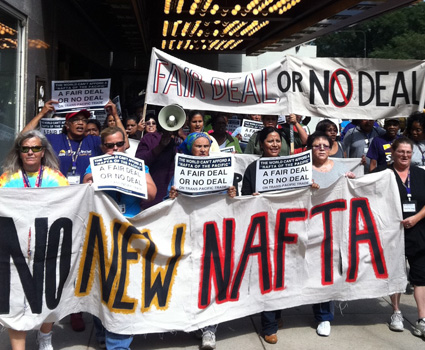Last call to get off the Trans-Pacific Express
In the coming weeks, Congress is expected to decide whether a potentially dangerous trade agreement should be allowed to pass through a process that would allow for little review or chance for improvement.
The agreement, the Trans-Pacific Partnership (TPP), has been negotiated largely in secret by the United States and 11 other countries. The exact terms of the agreement have not been revealed, though corporate lobbyists played a major role in crafting its provisions.
 The TPP would force American workers to compete for jobs with people in countries with drastically lower pay, benefits and labor standards. It’s just like the North American Free Trade Agreement (NAFTA) but on a much larger scale.
The TPP would force American workers to compete for jobs with people in countries with drastically lower pay, benefits and labor standards. It’s just like the North American Free Trade Agreement (NAFTA) but on a much larger scale.
Supporters of the TPP – which include the White House and “pro-business” Democrats and Republicans – want the TPP to be considered under “fast-track” rules, which allow the president to negotiate the pact and then send it to Congress for an up-or-down vote. “Fast-track” would limit the ability of Congress to make changes to the agreement that would make it more fair to American workers.
It's time to tell our representatives in Congress to say NO to "fast-track" and the TPP. Call your representatives and senators today – you can look up their contact information here.
Those who want the TPP to pass without scrutiny have made an argument for “fast-track” that relies on a distorted version of reality. Here’s the real truth about “fast-track” and the TPP:
Myth: “Fast track” puts Congress in the driver’s seat.
Reality: “Fast track” puts Congress and the American people in the back seat by surrendering Congress’ constitutional authority and locking the public out of trade negotiations.
Myth: We need “fast track” to keep labor standards in the TPP high.
Reality: Fast track can’t ensure high labor standards and has no accountability mechanism. The best way to ensure high labor standards in the TPP is to stop fast track and allow the American public and their representatives to participate in trade policy making.
Myth: Fast track and the TPP will create jobs.
Reality: Based on past trade deals, the TPP will kill jobs. NAFTA cost the United States almost 700,000 jobs and the Korea Free Trade Agreement has cost more than 60,000 jobs in just a few years. To create jobs or raise wages, the focus of deals must be on raising living standards and increasing net exports.
Myth: Labor is at the negotiating table.
Reality: That’s 100 percent false. About 5 percent of trade advisors represent labor, and those advisers are locked out of the negotiating room. About 90 percent of cleared trade advisors represent business interests.
Myth: If we don’t “fast-track” the TPP, China will write the rules of international trade.
Reality: The rules now in the TPP copy those in NAFTA and other agreements, meaning they favor global corporations over small businesses, family farms and working people. Meanwhile, China already doesn’t play by the rules and is known for manipulating its currency and failing to comply with trade agreements.
Myth: Fast track and the TPP will be an improvement on the status quo.
Reality: The TPP would cover 40 percent of the world’s GDP with investor-to-state-dispute settlements (ISDS), a private justice system that allows foreign investors to bypass American courts – that would be significantly worse than the status quo. Weak rules that allow China to benefit from the TPP without joining are worse than the status quo. Fast track would limit Congress’ ability to improve trade agreements and would lock in economic rules that create a race to the bottom. That’s worse than the status quo.
Myth: Fast track will help us move trade agreements that will boost wages and benefit the middle class.
Reality: If U.S. trade deal boosted wages and benefited the middle class, you wouldn’t need “fast track” to pass them. Fast-tracked deals give extraordinary legal tools to corporations, which use them to play workers and nations off each other in a race to the bottom. U.S. workers have been forced to give back hard-earned pay, pensions and seniority rights just to keep jobs in the United States.



